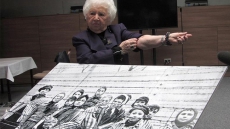TORONTO — A computer system allowing Ontario's children's aid societies to share information — the main recommendation in a coroner's inquest into the 2002 death of a five-year-old boy — won't be fully operational until 2020.
Jeffrey Baldwin starved to death at the hands of his grandparents, who the Catholic Children's Aid Society tasked with caring for the boy, but the coroner's inquest into his death didn't get underway until 2013, when the grandparents exhausted appeals of their convictions for second-degree murder.
Among the more than 100 recommendations the coroner's jury issued one year ago was an urgent call for the government to fully implement the Child Protection Information Network by February 2016.
The Ministry of Children and Youth Services submitted its responses to the jury recommendations this week, saying that while the development and testing of CPIN is complete, it has so far only been rolled out to three of the 46 children's aid societies, with two more expected to be using it by the end of March.
One year ago the ministry said it expected seven agencies to be using the system by the summer of 2014.
"The ministry has established thorough processes and automated system tools to complete data migration, but the work is complex, time consuming and requires accuracy," the ministry wrote in its responses.
The jury recommended sweeping changes to the child welfare system after the inquest heard that Jeffrey was a healthy baby when he and his siblings were placed in the care of their grandparents, but over the next few years he starved to death, locked in a cold, fetid bedroom. When he died just shy of his sixth birthday his weight was that of a 10-month-old infant.
The inquest heard that Jeffrey's grandparents, Elva Bottineau and Norman Kidman, had both previously been convicted of abusing children, but due to inadequate record checks, poor information sharing between different children's aid societies and records under several different names for the grandmother meant no one discovered how dangerous the pair was until after Jeffrey died.
Standards surrounding so-called kinship care have since changed, but the jury's recommendations suggested there is much more to be done:
— The jury: All societies' records, including historical data and archives, be digitized in the new network. The ministry said that won't be done.
— The jury: The ministry should consider amalgamating all 46 individual children's aid societies into one co-ordinated agency. The ministry said it was developing a "shared services program" instead of amalgamating the societies.
— The jury: Workers should be allowed to access CPIN and the child abuse registry when they are assessing an alternate caregiver, such as a relative, and not just when investigating a child protection concern. The ministry said this is under consideration.
— The jury: There should be changes to who is subject to vulnerable sector screening when a child is being placed with relatives. The ministry said the changes are under consideration.
The ministry said it is reviewing the Child and Family Services Act, expected to be complete in April, with an eye to creating new rules for the collection and disclosure of CAS records as well as information sharing. It also said that Ontario's child protection standards have been "re-drafted" and will be released this year





